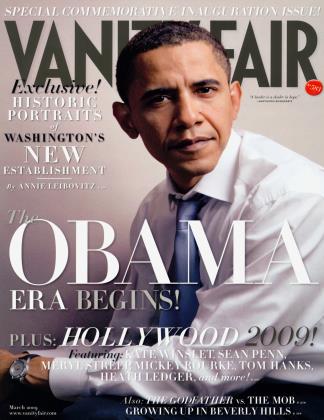Sign In to Your Account
Subscribers have complete access to the archive.
Sign In Not a Subscriber?Join NowHOT TYPE ELISSA SCHAPPELL
Enter the saucy southern ladies. The era of Scarlett O'Hara is long Gone with the Wind, but her story still fires our imagination. Molly Haskell explains why it mattered and, Frankly, My Dear (Yale), why it continues to. Flannery (Little, Brown) O'Connor lives and breathes—and spits firein Brad Gooch's portrait of the too short life of the peacock-loving writer who dealt in the dark grotesqueries of human nature.
"I CAN'T GO ON, I'LL GO ON."
Waiting for The Letters of Samuel Beckett, 1929-1940 (Cambridge)? Martha Dow Fehsenfeld and Lois More Overbeck pore over his epistles. The orphaned hero of Elie Wiesel's novel A Mad Desire to Dance (Knopf) is tormented by longing and familial lies. Alexander Waugh recalls the domestic battles waged in Die House of Wittgenstein (Doubleday). Poet Anne Carson'sAn Oresteia (Faber and Faber) brings to life a chorus of accursed Greek tragedies. Psychedelic-art guru Alan Aldridge is The Man with Kaleidoscope Eyes (Abrams).
As a child soldier in the army of Jehovah's Witnesses, Kyria Abrahams grew up believing I'm Perfect, You're Doomed (Touchstone). A father and daughter live off the grid, yet perilously close to civilization, in Peter Rock's haunting novel My Abandonment (Houghton Mifflin). Sam Staggs'sBorn to Be Hurt (St. Martin's) rips open the blouse of the mother of all melodramas—Douglas Sirk's Imitation of Life—exposing a film that's part campy chick flick, part darkly ironic examination of race.
Thomas E. Ricks eavesdrops on the highranking squabble over The Gamble (Penguin), General Petraeus's plan to launch the surge in Iraq. Legendary war reporter Michael Herr'sDispatches (Everyman's Library) is reissued for a new generation. Harold Varmus appraises The Art and Politics of Science (Norton). Craig Mullaney curses The Unforgiving Minute (Penguin). Ulrich Boser cracks the cold case of the art world's greatest unsolved mystery, The Gardner Heist (Collins). Short-story writer Wells Tower shows up for his auspicious debut with Everything Ravaged, Everything Burned (Farrar, Straus and Giroux). Editor Paul Buhle's graphic history of The Beats (Hill and Wang)—with riffs from cats such as Harvey Pekar and Trina Robbins—burns like a Roman candle. As an original writer for Saturday Night Live,Tom Davis found that the traditional comedian's diet of sex, drugs, and jokes left him with Thirty-Nine Years of Short-Term Memory Loss (Grove). Steve Brower shows that Satchmo (Abrams) didn't just wail on the trumpet—Dipper Mouth also had some serious art chops. Arthur Laurents reminisces Mainly on Directing (Knopf).
Charlotte Chandler'sShe Always Knew How (Simon & Schuster) casts Mae West not simply as the scandal-courting, man-eating blonde bombshell, but also as a proto-feminist icon who exploited her sexuality to grab headlines, power, and, um, hearts. As Mae said, "You only live once, but if you do it right, once is enough."
Shortly, But Fondly
The Veiled Suite (Norton) posthumously collects the poems of the fiercely adored and fearless virtuoso Agha Shahid Ali. Thelma Meyer hits pay dirt with Mrs. Meyer's Clean Home (Hachette). Robert Hofler screens Variety's "The Movie That Changed My Life" (Da Capo). Jessica Clayton lives for Vintage Paris Couture (Universe). David Thomson aims to Try to Tell the Story (Knopf). Margaret Wagner'sWorld War II 365 Days (Abrams) is an explosion of photos, letters, and diaries. David Grann bushwhacks into The Lost City of Z (Doubleday). According to Johnny's brother, Daniel Depp, Hollywood is a Loser's Town (Simon & Schuster).
 View Full Issue
View Full Issue












Subscribers have complete access to the archive.
Sign In Not a Subscriber?Join Now